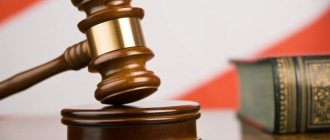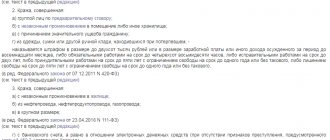1. The suspect and accused are provided with the right to defense, which they can exercise personally or with the help of a defense attorney and (or) legal representative.
2. The court, prosecutor, investigator and interrogating officer explain to the suspect and accused their rights and provide them with the opportunity to defend themselves by all methods and means not prohibited by this Code.
3. In cases provided for by this Code, the mandatory participation of a defense attorney and (or) legal representative of the suspect or accused is ensured by officials conducting criminal proceedings.
4. In cases provided for by this Code and other federal laws, the suspect and accused may use the assistance of a defense attorney free of charge.
Commentary on Article 16 of the Code of Criminal Procedure of the Russian Federation
1. The right of a suspect or accused to defense is a set of powers granted to them by law to refute suspicion or accusation or to mitigate liability.
This is a generally recognized international principle. In accordance with paragraph “c” of Part 3 of Art. 6 of the European Convention for the Protection of Human Rights and Fundamental Freedoms of 1950 <1> everyone accused of a criminal offense must be given sufficient time to prepare for the defense of their interests.
——————————— <1> NW RF. 2001. N 2. Art. 163.
2. The right of the accused to defense in criminal proceedings is exercised in two forms: 1) defense carried out by the accused or suspect himself; 2) protection carried out with the help of a defender (lawyer or other person).
3. The court (judge), prosecutor, investigator, body of inquiry, interrogator are obliged to assist the accused and suspect in exercising their right to defense, explain to them their rights and obligations (Part 6 of Article 47, Article 92 of the Code of Criminal Procedure). The accused and the suspect exercise their right to defense by testifying, receiving copies of the decision to charge as an accused, the decision to apply a preventive measure, indictment or indictment, by testifying on the charge brought or refusing to testify, filing requests for interrogation at the established time the legal period from the moment of arrest; presentation of evidence, submission of petitions and challenges, filing complaints and statements, familiarization with materials sent to the court regarding arrest and detention (see commentary to Articles 46 and 47 of the Code of Criminal Procedure).
4. The suspect and accused have the right to receive timely legal assistance, which they need to protect themselves from suspicion or accusation. In contrast to the Code of Criminal Procedure of the RSFSR, Part 3, Art. 49 of this Code provides for the admission of a defense lawyer from the moment of the actual detention of the suspect, and not from the moment the protocol of detention is announced to him, as was previously the case.
The law obliges judges, prosecutors, investigators, and persons conducting inquiries to take all measures provided for by law to ensure the right of the accused to defense. Failure of these bodies to fulfill their duties to ensure the right to defense is a violation of the criminal procedural law and entails the cancellation of the sentence (see commentary to paragraph 4, part 2, article 38 of the Code of Criminal Procedure; paragraph 2 of the Resolution of the Plenum of the Supreme Court of the Russian Federation of December 20, 1994 city N 9).
5. The court, prosecutor, investigator, and interrogating officer are obliged to take measures to ensure that the accused has the opportunity to invite a defense attorney of his choice.
6. In cases where a lawyer participates in a case on the appointment of an inquirer, investigator, prosecutor or court, legal assistance is provided to the accused free of charge (Part 3 of Article 51 of the Code of Criminal Procedure and commentary thereto).
Article 16 of the Code of Criminal Procedure of the Russian Federation. Providing the suspect and accused with the right to defense (current version)
1. The right to protection from suspicion and accusation is granted by law to the suspect and accused. The protection of other rights and legitimate interests of these persons is covered by the principles of respect for the honor and dignity of the individual, the inviolability of the person, home, the protection of the rights and freedoms of man and citizen in criminal proceedings, the secrecy of correspondence, telephone and other conversations, postal, telegraph and other messages (see. commentary to Articles 9 - 13). Protection of these (other) rights within the framework of criminal proceedings can be carried out in the manner of appealing the actions and decisions of officials, provided for in Chapter. 16 and art. 19 of the Code, as well as through compensation for damage to persons illegally subjected to procedural coercive measures (Part 3 of Article 133). The right to defense belongs not only to the accused and suspect, who are officially recognized in this procedural status, but also to any person who is interrogated about circumstances of an incriminating nature, as well as to everyone against whom actions are taken in the course of criminal prosecution.
2. The concept of the right to defense includes:
- rights that the suspect and accused can exercise through their own actions by presenting evidence, participating in interrogations of other accused (defendants), victims, witnesses and experts in court, filing complaints against the actions and decisions of the inquirer, investigator, prosecutor and the court (see about them commentary to Article 47);
- rights that can be exercised by them with the help of a defender and legal representative through the implementation of the rights and obligations of these persons (see the commentary on them to Articles 48 - 53);
- the presence of the interrogator, investigator, prosecutor and the court with responsibilities corresponding to the rights of the suspect, accused, legal representative and defense attorney, if these rights can be realized only by performing certain counter actions by the named officials and bodies (ensure the participation of a defense attorney, provide in cases established by law to familiarize yourself with the necessary documents and case materials, give the opportunity to make copies of them, consider petitions and complaints, hear testimony through interrogation, etc.);
- application of procedural guarantees of protection, operating by force of law, even in the absence of expression of the will of the interested parties. This is the presumption of innocence, including placing the burden of proof on the prosecutor and the interpretation of doubt in favor of the accused, the rules on the inadmissibility of evidence (Article 75), the rule on the inadmissibility of turning the charge for the worse (Articles 385, 387, 405), rules ensuring freedom appeals through the appellate and cassation procedures against sentences and other court decisions (Article 370, Part 1 of Article 385).
3. To explain to the suspect and accused their rights, see the commentary. to Art. eleven.
4. As follows from the content of part two of this article, the suspect and accused have the right to defend themselves by all methods and means not prohibited by this Code. This norm implements the legal principle - “everything that is not prohibited by law is permitted.” In fact, the ban can be established not only by the norms of the Code of Criminal Procedure itself, as one could understand from a literal reading of the text of the commented article, but also by some other laws. For example, neither the accused, nor the defense attorney, nor other persons have the right to use methods and means classified by the Law “On Operational-Investigative Activities” as the exclusive competence of operational-investigative bodies. In the absence of a prohibition, any method and means of defense may be used (see commentary to Article 86 of this Code).
On providing the suspect and accused with the assistance of a defense lawyer, see the commentary. to Art. Art. 49 - 51.
Comment source:
Ed. A.V. Smirnova “COMMENTARY ON THE CRIMINAL PROCEDURE CODE OF THE RUSSIAN FEDERATION” (ARTICLE BY ARTICLE), 5th edition
SMIRNOV A.V., KALINOVSKY K.B., 2009
Another commentary on Article 16 of the Criminal Procedure Code of the Russian Federation
1. This principle organically follows from the presumption of innocence: the right to defense is necessary only for those who have not yet been found guilty, and the conclusion of guilt is not predetermined by anyone. The state authorities conducting the criminal process, in other words, having this criminal case in their proceedings and bearing responsibility for its successful progress and completion, are obliged to ensure the implementation of the right to defense.
2. The starting point of the entire complex of legal relations between the investigative body, the suspect and the accused is the official announcement to the citizen of what he is suspected or accused of and what rights from this moment he is granted for the purpose of protection. Without this procedural point, the investigative body cannot carry out the function of criminal prosecution. “You are suspected of such and such” is only the first part of the traditional formula with which criminal prosecution begins; the second is to clarify: “You have the right.”; and the third is in a sentence that is not spoken, but is implied as the main thing: “Defend yourself.”
Everything about criminal cases
Go to the text of the Code of Criminal Procedure
Url Additional information:
Two methods of protection
- Part 1 16 Code of Criminal Procedure
the accused has the right to defend himself - in person
- Part 1 16 Code of Criminal Procedure
the accused has the right to defend himself - with the help of a defense lawyer
Responsibilities of the investigator, court
- Part 2 16 Code of Criminal Procedure
the accused is obliged to explain his rights
- Part 2 16 Code of Criminal Procedure
the accused must be given the opportunity to defend himself
Mandatory Defender
- Part 3 16 Code of Criminal Procedure
mandatory provision of a lawyer
- Part 4 16 Code of Criminal Procedure
right to free defense
Plenum of the Supreme Court
Plenum
on the practice of applying the rules on the right to defense dated June 30, 2015. No. 29
Right to defense
Right to defense
, a selection of practical materials
Article 16 of the Code of Criminal Procedure. Providing the suspect and accused with the right to defense
Url Additional information:
- P.2
Plenum No. 29, the right to defense, these are 2 rights - to a defender and to self-defense
Two different rights
Right to defense
these are two different rights (to self-defense and to the assistance of a defender)
1) The suspect and accused are provided with
the right to defense, which they can exercise:
Url Additional information:
— clause 2
Plenum No. 29 the right to self-defense (the right to defend oneself)
— personally;
Url Additional information:
— Part 1 50 Code of Criminal Procedure
a defense attorney may be invited by the accused himself
- Part 2 50 Code of Criminal Procedure
a defense attorney may be appointed at the request of the accused
— clause 8, part 4, 47 Code of Criminal Procedure
the right of the accused to a lawyer (including free of charge)
- or with the help of a defense attorney and (or)
legal representative.
2) Court, prosecutor, investigator and interrogating officer:
Url Additional information:
- Part 1 11 Code of Criminal Procedure
participants in the process must be explained their rights
- Part 2 16 Code of Criminal Procedure
the accused is obliged to explain his rights
- Part 5 164 Code of Criminal Procedure
clarification of the rights of participants during each investigative action
- Part 10 166 Code of Criminal Procedure
the protocols must contain a record of clarification of rights
— 267 Code of Criminal Procedure
the judge is obliged to explain to the defendant his rights (
Part 4 47 of the Code of Criminal Procedure
)
— clause 9, part 3, 259 Code of Criminal Procedure
indication in the protocol of clarification of rights to participants
— clause 3
Plenum No. 29 explaining the rights of the accused at all stages of the process
Practice
— Determination No. APU-17
one of the rights is not explained (violation of
Part 2 16 of the Code of Criminal Procedure
)
Clarification of rights
Clarification of rights
participants in criminal proceedings, selection of materials
— explain to the suspect and accused their rights;
Url Additional information:
- Part 2 45
Constitution: the right to defend oneself by all not prohibited means
- Part 1 11 Code of Criminal Procedure
participants are provided with the opportunity to exercise their rights
— clause 2
Plenum No. 29 the right to defend oneself by any legal means
- and provide them with the opportunity to defend themselves by all methods and means not prohibited by the Criminal Procedure Code.
Url Additional information:
- Part 3 51 Code of Criminal Procedure
if a defense attorney is not invited, he is appointed by the investigator and the court
3) In cases provided for by the Criminal Procedure Code, the mandatory participation of a defense attorney and (or) legal representative of the suspect or accused is ensured by officials conducting criminal proceedings.
Url Additional information:
Regulatory framework (right to a free lawyer)
- Part 4 16 Code of Criminal Procedure
right to free defense
- Part 5 50 Code of Criminal Procedure
payment for an appointed lawyer from the budget (initially)
— Part 1 48
Constitution of the right to free legal assistance
— clause 5
Plenum No. 42 list of situations when costs are not borne by the defendant
Special order
Real free
lawyer only for special order
Fee waiver
Exemption from payment
state lawyer (
clause 7
of Plenum No. 42)
4) In cases provided for by the Code of Criminal Procedure and other federal laws, the suspect and accused may use the assistance of a defense lawyer free of charge.
Return to the text of the Code of Criminal Procedure
Seek advice
Article 16. “Criminal Procedure Code of the Russian Federation” dated December 18, 2001 N 174-FZ (as amended on December 30, 2021)
1. The right to protection from suspicion and accusation is granted by law to the suspect and accused. The protection of other rights and legitimate interests of these persons is covered by the principles of respect for the honor and dignity of the individual, the inviolability of the person, home, the protection of the rights and freedoms of man and citizen in criminal proceedings, the secrecy of correspondence, telephone and other conversations, postal, telegraph and other messages (see. commentary to Articles 9 - 13). Protection of these (other) rights within the framework of criminal proceedings can be carried out in the manner of appealing the actions and decisions of officials, provided for in Chapter. 16 and art. 19 of the Code, as well as through compensation for damage to persons illegally subjected to procedural coercive measures (Part 3 of Article 133). The right to defense belongs not only to the accused and suspect, who are officially recognized in this procedural status, but also to any person who is interrogated about circumstances of an incriminating nature, as well as to everyone against whom actions are taken in the course of criminal prosecution.
2. The concept of the right to defense includes:
- rights that the suspect and accused can exercise through their own actions by presenting evidence, participating in interrogations of other accused (defendants), victims, witnesses and experts in court, filing complaints against the actions and decisions of the inquirer, investigator, prosecutor and the court (see about them commentary to Article 47);
- rights that can be exercised by them with the help of a defender and legal representative through the implementation of the rights and obligations of these persons (see the commentary on them to Articles 48 - 53);
- the presence of the interrogator, investigator, prosecutor and the court with responsibilities corresponding to the rights of the suspect, accused, legal representative and defense attorney, if these rights can be realized only by performing certain counter actions by the named officials and bodies (ensure the participation of a defense attorney, provide in cases established by law to familiarize yourself with the necessary documents and case materials, give the opportunity to make copies of them, consider petitions and complaints, hear testimony through interrogation, etc.);
- application of procedural guarantees of protection, operating by force of law, even in the absence of expression of the will of the interested parties. This is the presumption of innocence, including placing the burden of proof on the prosecutor and the interpretation of doubt in favor of the accused, the rules on the inadmissibility of evidence (Article 75), the rule on the inadmissibility of turning the charge for the worse (Articles 385, 387, 405), rules ensuring freedom appeals through the appellate and cassation procedures against sentences and other court decisions (Article 370, Part 1 of Article 385).
3. To explain to the suspect and accused their rights, see the commentary. to Art. eleven.
4. As follows from the content of part two of this article, the suspect and accused have the right to defend themselves by all methods and means not prohibited by this Code. This norm implements the legal principle - “everything that is not prohibited by law is permitted.” In fact, the ban can be established not only by the norms of the Code of Criminal Procedure itself, as one could understand from a literal reading of the text of the commented article, but also by some other laws. For example, neither the accused, nor the defense attorney, nor other persons have the right to use methods and means classified by the Law “On Operational-Investigative Activities” as the exclusive competence of operational-investigative bodies. In the absence of a prohibition, any method and means of defense may be used (see commentary to Article 86 of this Code).
On providing the suspect and accused with the assistance of a defense lawyer, see the commentary. to Art. Art. 49 - 51.
SMIRNOV A.V., KALINOVSKY K.B.
Ed. A.V. Smirnova “COMMENTARY ON THE CRIMINAL PROCEDURE CODE OF THE RUSSIAN FEDERATION” (ARTICLE BY ARTICLE), 5th edition
year 2009





